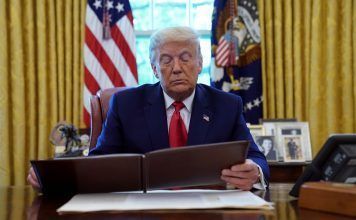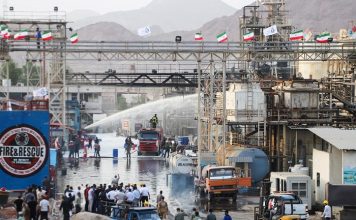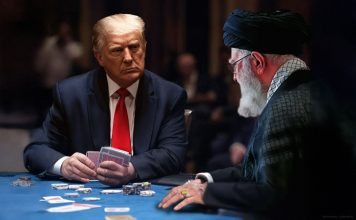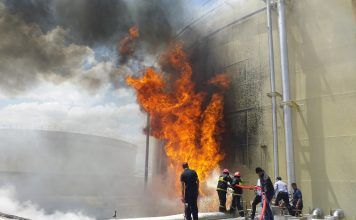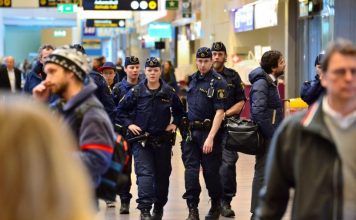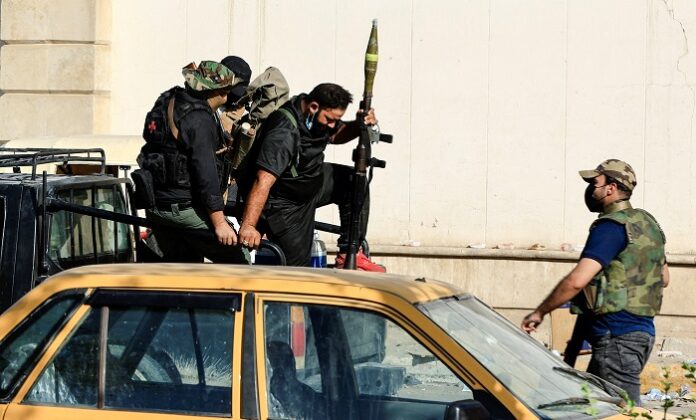
By John Davison
BAGHDAD, Aug 30 (Reuters) – Iraq’s powerful cleric Moqtada al-Sadr ordered his followers to end their protests in central Baghdad on Tuesday and apologised to Iraqis after 22 people were killed in clashes between rival Shi’ite Muslim groups.
“This is not a revolution because it has lost its peaceful character,” Sadr said. “The spilling of Iraqi blood is forbidden.”
[aesop_image img=”https://kayhanlife.com/wp-content/uploads/2022/08/2022-08-29T142558Z_1765507887_RC2D6W95TZGN_RTRMADP_3_IRAQ-POLITICS-SADR-scaled.jpg” panorama=”off” credit=” REUTERS/Thaier Al-Sudani” align=”center” lightbox=”off” captionsrc=”custom” caption=”Supporters of Iraqi populist leader Moqtada al-Sadr clash with supporters of the Coordination Framework, a group of Shi’ite parties, at the Green Zone in Baghdad, Iraq August 29, 2022.” captionposition=”left” revealfx=”off” overlay_revealfx=”off”]
In a televised address delivered at 1 p.m. (1000 GMT), Sadr set a one-hour deadline for his supporters to leave their protests in the fortified Green Zone in central Baghdad, where they have occupied parliament for weeks.
“Within 60 minutes, if the Sadrist Movement does not withdraw, including from the sit-in at parliament, then even I will leave the movement,” Sadr said.
His address came a day after the worst violence in the Iraqi capital in years – which follows a 10-month political deadlock since October’s parliamentary election – prompted neighbouring Iran to close its border and halt flights to Iraq.
The prolonged political standoff, during which the two camps have competed for power, has given the country its longest run without a government and led to new unrest as Iraq struggles to recover from decades of conflict.
ANALYSIS – Crisis in Iraq Tests Its Stability and Iran’s Sway
This time the fighting, in which Sadr’s supporters faced off against armed groups loyal to Iran, is among the Shi’ite majority that has ruled Iraq since the 2003 U.S. invasion which toppled Sunni dictator Saddam Hussein.
“There are uncontrolled militias, yes, but that does not mean the Sadrist Movement should also be uncontrolled,” Sadr, a former anti-U.S. insurgent leader, said in his address.
Earlier on Tuesday militants fired rockets at the Green Zone and gunmen cruised in pickup trucks carrying machine guns and brandishing grenade launchers, while residents observed a curfew. Overnight, sustained gun and rocket fire rang out across the city.
An Iraqi government official, speaking on condition of anonymity, said authorities were in no position to impose control. “The government is powerless to stop this, because the military is divided into (Iran) loyalists and Sadrists as well,” the official said.
Monday’s violence was prompted by Sadr’s announcement that he would withdraw from all political activity – a decision he said was in response to the failure of other Shi’ite leaders and parties to reform a corrupt and decaying governing system.
The Iraqi military declared an open-ended nationwide curfew and urged the protesters to leave the Green Zone, while the United States described the unrest as disturbing and called for dialogue to ease Iraq’s political problems.
White House National Security Council spokesperson John Kirby said that Washington saw no immediate need to evacuate staff from its embassy in Baghdad’s Green Zone. Read full story
IRAN CLOSES BORDER, HALTS FLIGHTS
Sadr has positioned himself as a nationalist who opposes all foreign interference, whether from the United States and the West or from Iran.
He has insisted on early elections and the dissolution of parliament, saying that no politician who has been in power since the U.S. invasion in 2003 should hold office.
He commands a thousands-strong militia and has millions of loyal supporters across the country. His opponents, longtime allies of Tehran, control dozens of paramilitary groups heavily armed and trained by Iranian forces.
[aesop_image img=”https://kayhanlife.com/wp-content/uploads/2022/08/2020-03-08T130920Z_2_LVA001C46YFD3_RTRWNEV_E_7102-HEALTH-CORONAVIRUS-IRAQ-IRAN.jpg” panorama=”off” credit=”Shalamcha Border Crossing. REUTERS./ ” align=”center” lightbox=”on” captionsrc=”custom” captionposition=”left” revealfx=”off” overlay_revealfx=”off”]
Sadr and his opponents have long dominated state institutions and run large parts of the Iraqi state.
Neighbouring Iran closed its border with Iraq and urged its citizens to avoid travelling there, a senior official said. Iran’s state television said flights had also been halted “until further notice because of the unrest there”. Read full story
(Reporting by John Davison, Moataz Mohamed and Parisa Hafezi in Dubai; Writing by Nadine Awadalla and Dominic Evans; Editing by Alex Richardson and Tomasz Janowski)

